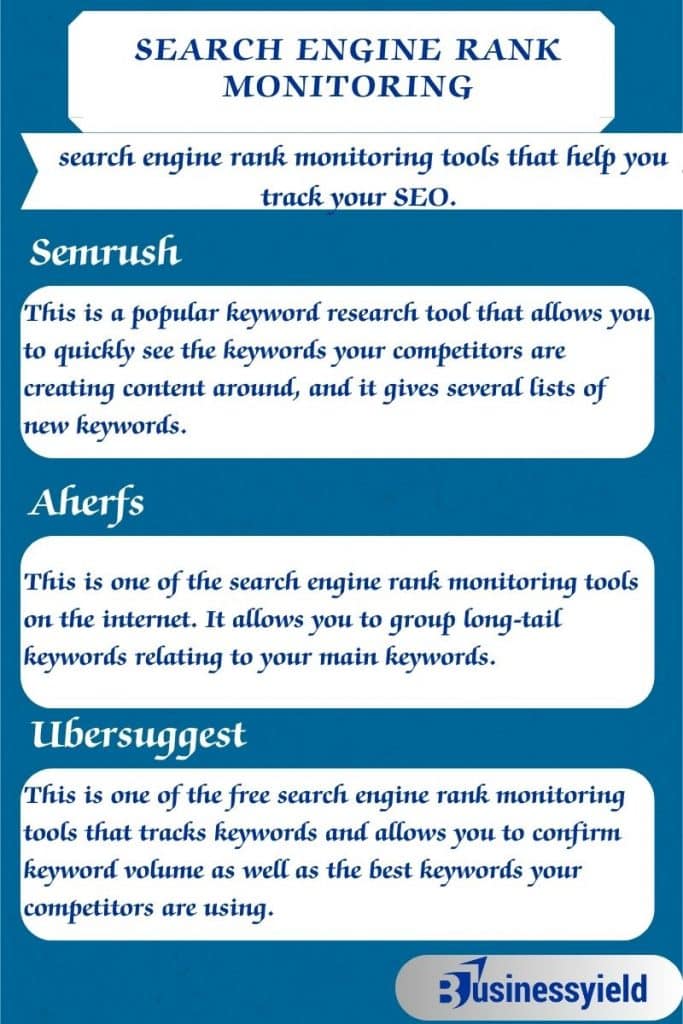If you are a brand owner, it is important to monitor your search engine rankings to learn the performance of your website. Besides, monitoring search engine rankings is important for directly impacting online visibility and revenue for a business. Furthermore, an effective SEO strategy is most important in today’s digital marketing landscape. The core component of any SEO strategy is to use tools like Google Analytics to track web traffic and search engine rankings.
I remember checking my website’s search engine ranking one day and realizing it had dropped. At that moment, I understood the critical role of search engine monitoring. Thus, search engine monitoring helps businesses maintain competitiveness in today’s digital world and continuously drive traffic to their sites. So, stay glued to this platform as I take you on this journey of learning about search engine rank monitoring and its software.
Key Points
- Search engine monitoring analyzes measurable SEO metrics to evaluate your SEO efforts. It includes SEO monitoring, reporting on the effectiveness of your strategies, and making suitable changes to implement the process based on the data insight.
- Marketers can determine the value of SEO’s contribution to marketing by analyzing the data. They measure success through SEO monitoring and identifying what worked and what didn’t.
- Metrics for monitoring SEO include organic traffic, keyword rankings, SERP visibility, and click-through rate.
- Search engine monitoring software includes Google Analytics, Google Search Console, WebFX SEO Checker, and Bing Webmaster.
- Semrush, Aherfs, and Ubersuggest are search engine rank monitoring tools that help you track your SEO.
Search Engine Monitoring
Search engine monitoring analyzes measurable SEO metrics to evaluate your SEO efforts. Moreover, SEO monitoring includes reporting on the effectiveness of your strategies and making suitable changes to implement the process based on the data insight. Also, marketers can determine the value of SEO’s contribution to marketing by analyzing data. These marketers measure success through SEO monitoring and identifying what worked and what didn’t. As a writer, the first time I launched my blog online, I noticed that my website didn’t have a lot of traffic. So, I applied search engine monitoring, which felt like detective work. Through SEO monitoring, I could understand that readers find my site through SEO metrics and analytics. This improved my search engine ranking and gave me valuable insights into my audience. This experience also helped me understand the value of SEO monitoring in pushing my blog forward.
Read Also: SEO Keywords: Simplified Guide On How To Do Keyword Research (+ Free Keyword Research Template)
Metrics to Monitor for SEO
Here are the metrics I recommend you monitor when running an SEO campaign.
#1. Organic Traffic
This is a good metric for monitoring SEO; It indicates how your web pages rank well for relevant keywords. Keywords are the words or phrases people search online. Thus, organic traffic is the number of visits to your site from unpaid search engine results. Furthermore, there’s a way to measure your organic traffic and that is Google Analytics. This tool has helped me track the number of visitors that come to my websites for organic search, analyze keywords that are bringing traffic, and also measure the effectiveness of my SEO over time. So, regularly monitoring organic traffic will help you identify trends, even monitor the impact of SEO changes, and make data-driven decisions to improve your website’s visibility and attract potential customers.
#2. Keyword Rankings
This means your website’s position on the search engine result page when a specific keyword word or phrase is searched for. For instance, if your website ranks on the first page of Google for a keyword, it means a high ranking. In keyword rankings, the higher you rank, the more traffic you get to your site. However, keyword rankings on a website can change at any time for some reason. It might be Google updating its algorithm, losing your backlinks, or a competitor’s update on their content. In addition, because I monitor my keyword rankings, I can always identify the keyword that drives the most traffic to my website. I also monitor changes in keyword rankings over time and identify new keyword opportunities. Also, I adjust my SEO strategy to improve my rankings for target keywords.
So, when you keep a close eye on your keyword rankings, you can optimize your website to attract more organic traffic and help your website stay ahead of the competition.
#3. SERP Visibility
This measures how frequently and prominently your website appears on search engine result pages for important keywords. SERP visibility is important to your website because if your SERP visibility is high, it means that your website will likely be seen by users searching for relevant keywords, leading to increased organic traffic. Besides, I can say that monitoring my SERP visibility has allowed me to track my website performance compared to competitors because It analyzes changes in the visibility of my website. It helped me to have a strong presence in search engine results, which has helped me build brand authority and credibility. In addition, improving SERP visibility on your website will increase organic trading and enhance your brand authority and competitive advantage in the digital marketplace.
#4. Impression
This is the total number of times your website was viewed in search engine results at a given time. It is an important metric used in search engine monitoring because it gives you the knowledge to know whether your efforts are helping you appear in search results. The first sign of SEO success is an increase in the number of impressions on your website. I have often applied steps to optimize my website, so I know that impressions increase over time when you take the necessary steps.
#5. Click-Through Rate
This is the percentage of users that click on your website from the SERP. It shows how your titles and descriptions in SERPs effectively attract the user’s attention and interest. Furthermore, to calculate the percentage, you divide the number of clicks by the number of impressions, then multiply that by 100. For instance, when my site appeared 50 times a month, and 5 people clicked on it, I divided 50 by 5, multiplied it by 100, and I got my CTR of 5%. You can do the same to know your click-through rate.
Checklist on How to Monitor SEO Using Click-Through Rate
Read Also: What Is SEM? Your Crash Course On Search Engine Marketing And Why It Matters
Search Engine Monitoring Software
SEO monitoring involves monitoring your website’s ranking on search engines. There are many pieces of software you can use for search engine monitoring. The following is the search engine monitoring software I have used, and I recommend you use it to monitor important metrics that contribute to your SEO goals:
#1. Google Analytics
This free tool is known for monitoring different metrics of your web pages during specific periods and in real time. It gives you information on referral traffic and user engagement. As a writer and a website owner, I can tell you that monitoring my website performance has become easy since I discovered Google Analytics. Now I can see the number of people visiting my site, where they come from, and their interests.
Additionally, Google Analytics tools are completely free and easy to use. Whether you are a beginner or an expert, I advise you to use this tool to succeed online.
#2. Google Search Console
This search engine monitoring software is especially known for tracking crawl errors and monitoring the keywords your pages rank for. It is an important software for starting your SEO efforts. Google Search Console gives you information on the keyword your page is ranking for and also the level of mobile-friendliness of your website. It also informs your site of the number of clicks, impressions, and average CTR. This software has been my guide in navigating the complex world of SEO. With Google Search Console, I crawl errors, monitor the keywords my page ranks for, and check how mobile-friendly my website is. Do you want your website to be noticed by search engines? I recommend this software as a secret weapon in your SEO arsenal to achieve your heart’s desires for your website.
#3. WebFX SEO Checker
Another software I recommend for search engine monitoring is Web FX SEO Checker. It provides a detailed SEO report to assist you in determining your site’s overall SEO health. This tool gives you reports about your sites, mobile friendliness, structured data, page speed, and backlinks. It gives you information on your website’s strengths and weaknesses and a detailed audit of on-page SEO, off-page SEO, technical SEO, and local SEO. As a website owner, this tool tells me the part of my website that needs optimization, how to optimize it, and the complexity of the proposed task.
#4. Bing Webmaster
This tool is known for checking your site for technical SEO errors. It also gives information about your website’s SEO health. Besides, regarding SEO, it is very easy to focus only on Google. But what about Bing? Bing is a web search engine like Google, but Microsoft owns and operates it. This is where Bing Webmaster comes in. As a website owner, I have learned the importance of not neglecting any potential traffic source. I recommend Bing Webmaster because it’s like having a second pair of eyes to always check your website for technical SEO errors to ensure its overall health. This tool has helped me identify and fix any issues that can hold me back from reaching a wider audience. Moreover, it is a simple yet powerful tool every website owner should have.
Read Also: What Is a Big Data Engineer, and How Do You Become One?
Search Engine Rank Monitoring
Search engine rank monitoring helps to monitor how a website or webpage ranks on a given search results page (SERP) for a specific keyword. Some tools help track or monitor your websites. These tools have general features, like query search data, SERP monitoring, and keyword performance tracking. These tools focus on search metrics for queries, not how important a website rank is. The following are search engine rank monitoring tools that help you track your SEO.

#1. Semrush
This popular keyword research tool allows you to quickly see the keywords your competitors are creating content about, giving several lists of new keywords. As a writer, I use this tool to research keyword rankings based on competitors’ URLs and track the keywords my customers use most.
#2. Aherfs
This is one of the search engine rank monitoring tools on the internet. It allows you to group long-tail keywords relating to your main keywords. Furthermore, it also captures valuable ranking data and views the search volume of each term. This tool benefited me as a writer; its ability to group long tail keywords, provide ranking data, and show search volumes always helps me optimize my content and see my articles climb the search engine ranking.
#3. Ubersuggest
This free search engine rank monitoring tool tracks keywords and allows you to confirm keyword volume and the best keywords your competitors are using. Furthermore, it has features to analyze websites, find keyword opportunities, and track performance. Some time ago, in my early days as a website owner, I strived to boost my visibility online. When I turned to Ubersuggest, I could consistently identify high-performing keywords in my niche and combine them in my articles. This tool helped boost my SEO rankings. It also revealed my competitor’s keyword strategies by analyzing their top-performing keywords. I suggest Ubersuggest for search engine monitoring because it transformed my SEO approach and keyword research and empowered me to create impactful and visible content.
How Do You Monitor SEO Effectiveness?
You can monitor your SEO effectiveness by monitoring the following metrics to help survey your performance:
- SERPS
- Impressions
- Organic search traffic
- Click-through rate (CTR)
- Domain Authority
- Technical Site Health
What Is the Most Important Thing to Track for SEO?
The following are important metrics to track in SEO:
- Exit rate
- Pages per session
- Average page load time
- Core Web Vitals
- Backlinks and referring domains
- Top keywords ranked
- Pages crawled per day
- Bounce rate
What Should Be in a Monthly SEO Report?
It should include an overview of the number of clicks they get on every ranking keyword. This will give a better idea of the keywords driving better results.






